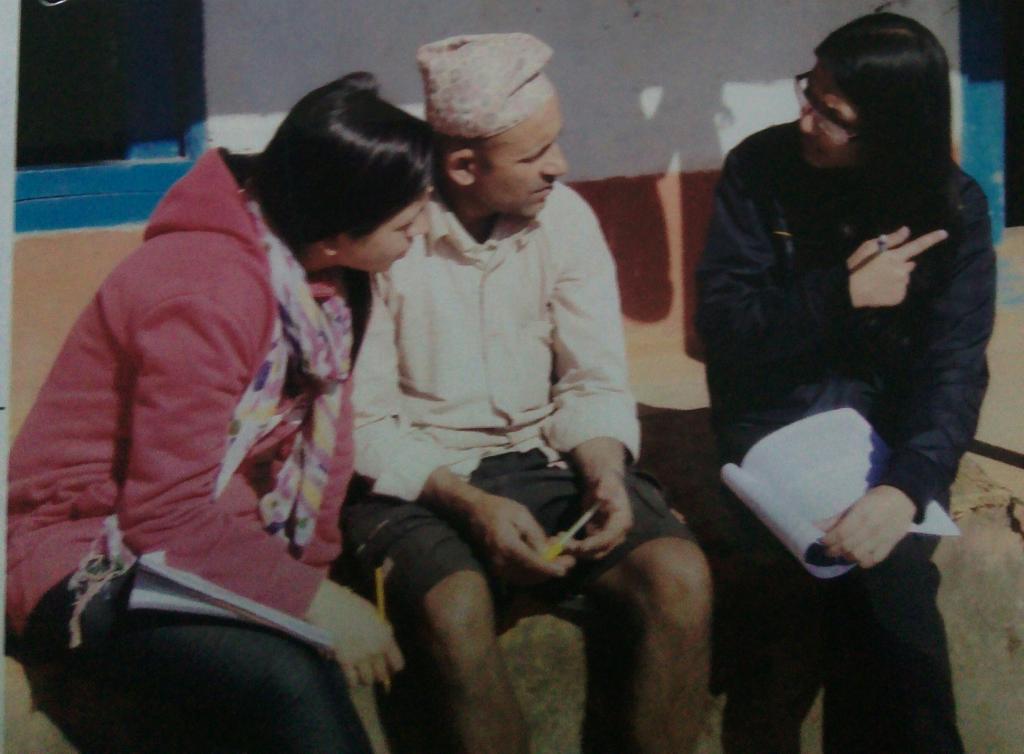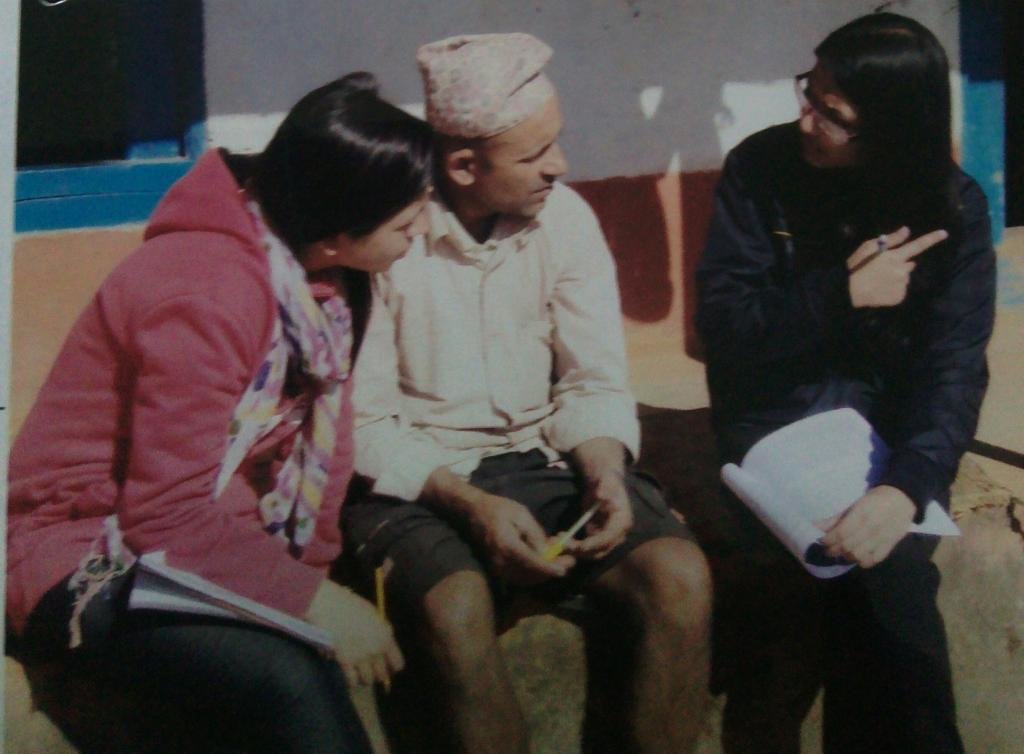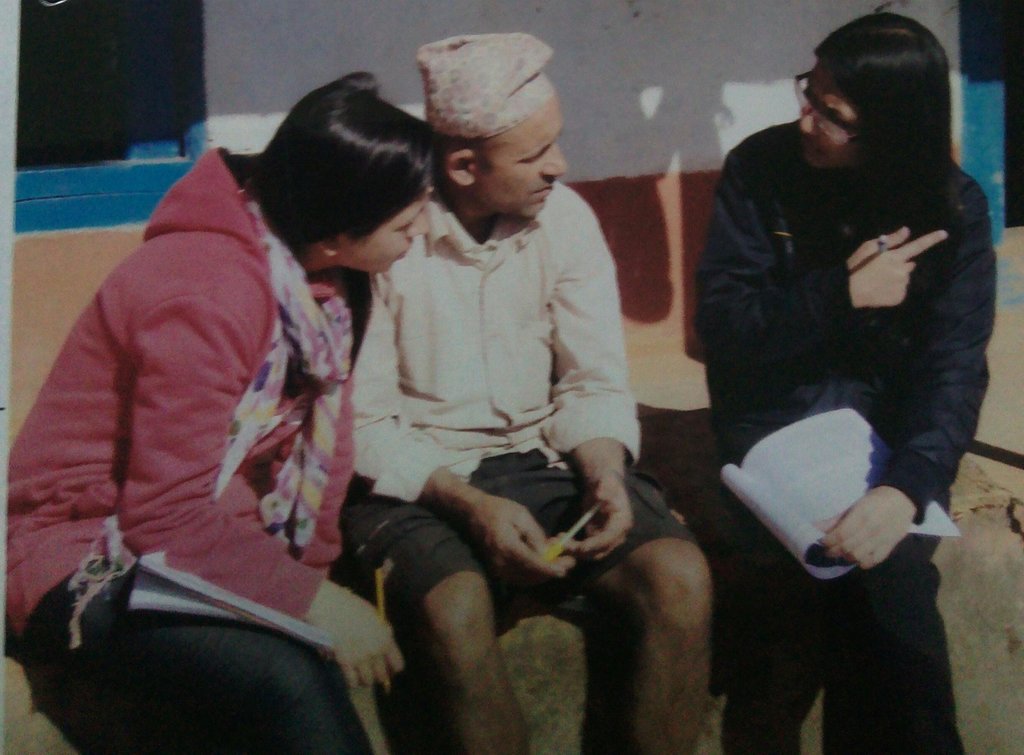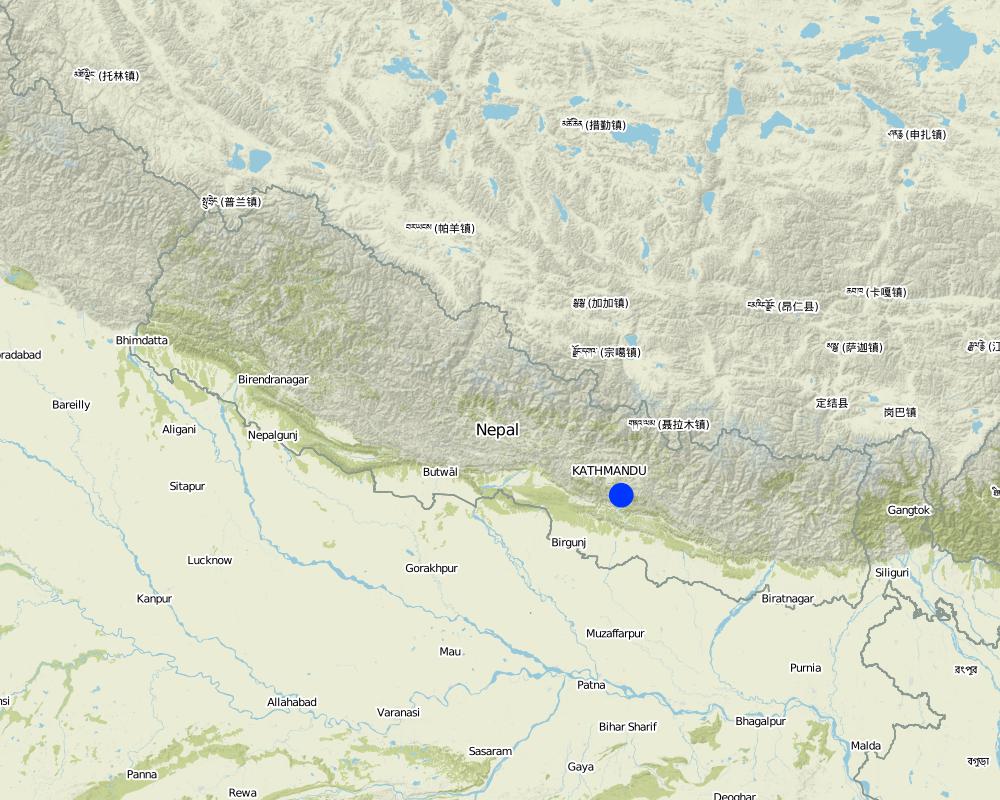Chyamrangbesi - A smoke free zone by using improved cooling stove [Nepal]
- Creación:
- Actualización:
- Compilador: Sabita Aryal
- Editor: –
- Revisor: Fabian Ottiger
Chyamrangbesi- Dhuwa Muta Chhetra
approaches_2592 - Nepal
Visualizar secciones
Expandir todo Colapsar todos1. Información general
1.2 Detalles de contacto de las personas de referencia e instituciones involucradas en la evaluación y la documentación del Enfoque
Nombre de la(s) institución(es) que facilitaron la documentación/ evaluación del Enfoque si fuera relevante)
Kathmandu University (KU) - NepalNombre de la(s) institución(es) que facilitaron la documentación/ evaluación del Enfoque si fuera relevante)
Sarada Batase Village Development Committee (Sarada Batase VDC) - Nepal1.3 Condiciones referidas al uso de datos documentados mediante WOCAT
¿Cuándo se compilaron los datos (en el campo)?
18/01/2014
El compilador y la/s persona(s) de referencia claves aceptan las condiciones acerca del uso de los datos documentados mediante WOCAT :
Sí
1.4 Referencia/s al/los Cuestionario(s) de Tecnologías MST
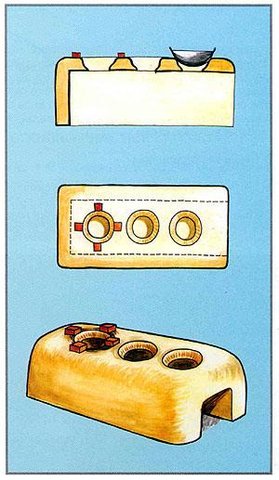
Khuwa making by the use of Improved stove [Nepal]
The technology used is improved stove. An improved stove is a device that is designed to consume less fuel and save cooking time,convenient in cooking process and creates smokeless environment or reduction in volume of smoke against the traditional stove.
- Compilador: Sabita Aryal

Improved Stove for household cooking use [Nepal]
The technoloigy is engineered in such a way that there will be less consumption of wood and less emission of smoke.
- Compilador: Sabita Aryal
2. Descripción del Enfoque MST
2.1 Breve descripción del Enfoque
The ways and means used to promote and implement to improved stove to improve human well-being and sustainable land use.
2.2 Descripción detallada del Enfoque MST
Descripción detallada del Enfoque MST:
Aims / objectives: The main objectives of the approach was to conserve forest and to improve human well-being
villagers facing major health risks due to smoke like eye itchiness, allergies, bronchitis.
Methods: The idea was proposed by REMRIC Nepal and was supported by Nepal Government. The approach was further enhanced by VDC and few local committes, public participation was an important part of the approach.
Stages of implementation: 1. Research : Questionnaires asked to land users and thier viewpoints noted.
2. Training : REMRIC provided trainiing to 9 people within the village
3. Financial support : Funding provided by VDC, REMRIC and other local bodies. Technician provided.
Role of stakeholders: Private contribution was not made. Organizations provided full financial funding and trained people. Involved organizations also did the research work and training people. A part from this, public participation had the significant role.
2.3 Fotos del Enfoque
2.5 País/ región/ lugares donde el Enfoque fue aplicado
País:
Nepal
Especifique más el lugar :
Kavrepalanchok
Map
×2.6 Fechas de inicio y conclusión del Enfoque
Indique año del inicio:
2069
Año de conclusión (si el Enfoque ya no se aplica):
2069
2.7 Tipo de Enfoque
- proyecto/ basado en un programa
2.8 Propósitos/ objetivos principales del Enfoque
The Approach focused mainly on SLM with other activities (Forest Production, Manure for agriculture, Improved human health, Kitchen efficiency)
The main objectives of the approach were to improve health hazards caused by the smoke trapped int he room and for forst conservation.
The SLM Approach addressed the following problems: 1. Lack of technical knowledge
2. Lack of cash to invest in SLM
2.9 Condiciones que facilitan o impiden la implementación de la/s Tecnología/s aplicadas bajo el Enfoque
disponibilidad/ acceso a recursos y servicios financieros
- impiden
Land user not ready to invest in experimental technology.
Treatment through the SLM Approach: Local bodies, organization, VDC funded the whole project.
conocimiento de MST, acceso a apoyo técnico
- impiden
Dur to lack of technical knowledge and information
Treatment through the SLM Approach: REMRIC tarined 9 people; each from one ward
carga de trabajo, disponibilidad de mano de obra
- impiden
Soil, brick, rods needed to carry from sometimes far distant areas.
Treatment through the SLM Approach: Land users volunteered to carry items themselves
3. Participación y roles de las partes interesadas involucradas
3.1 Partes interesadas involucradas en el Enfoque y sus roles
- usuarios locales de tierras/ comunidades locales
Jyotisahakari, Nawa prativa, Chakreshwor, Siddhartha
Community involvement. As physical activities are more involved, men are majorly involved. 33% only women involved
- especialistas MST/consejeros agrícolas
REMRIC
- gobierno local
Chyamrangbesi VDC
- gobierno nacional (planificadores, autoridades)
Nepal government
- organización internacional
3.2 Involucramiento de los usuarios locales de tierras/ comunidades locales en las distintas fases del Enfoque
| Involucramiento de los usuarios locales de tierras/ comunidades locales | Especifique quién se involucró y describa las actividades | |
|---|---|---|
| iniciación/ motivación | interactivo | Public meetings, research questionnaires |
| planificación | interactivo | Interviews, public meetings |
| implementación | auto-movilización | responsibility of major and minor steps, casuale labor |
| monitoreo y evaluación | interactivo | Measurements/observations, interviews/questionnaires |
| Research | pasivo | Answer questionnaires, informed about SLM technology, but do not take the final decision. |
3.4 La toma de decisiones en la selección de Tecnología(s) MST
Especifique quién decidió la selección de las Tecnología/ Tecnologías a implementarse:
- principalmente por especialistas MST en consulta con usuarios de tierras
Explique:
Initiations of approach by REMRIC and later involvement of local bodies and active involvement of VDC. However, research done actively and consulted land users about family size, thier input was considered valuable.
Decisions on the method of implementing the SLM Technology were made by mainly by SLM specialists with consultation of land users. The implementation was made by mutual agreement between the SLM specialists and the land users. However, the funding was solely done by SLM specialists.
4. Apoyo técnico, fortalecimiento institucional y gestión del conocimiento
4.1 Construcción de capacidades / capacitación
¿Se proporcionó la capacitación a usuarios de tierras/ otras partes interesadas?
Sí
Especifique quién fue capacitado:
- usuarios de tierras
Si fuese relevante, también especifique género, edad, estatus, etnicidad, etc.
Male, 25-35 years of age
Forma de capacitación:
- de agricultor a agricultor
- áreas de demostración
- reuniones públicas
Temas avanzados:
Interviews/questionnaires, setup, construct and design technology
4.2 Servicio de asesoría
¿Los usuarios de tierras tienen acceso a un servicio de asesoría?
Sí
Describa/ comentarios:
Name of method used for advisory service: VDC; Key elements: Structure, Cost; But people have ample technical knowledge, also take advice from neighbours
Advisory service is inadequate to ensure the continuation of land conservation activities; Not that hard or costly to manage the technology. So, self sustaining is sufficient for continuation of technology.
4.3 Fortalecimiento institucional (desarrollo institucional)
¿Se establecieron o fortalecieron instituciones mediante el Enfoque?
- no
4.4 Monitoreo y evaluación
¿El monitoreo y la evaluación forman parte del Enfoque?
Sí
Comentarios:
bio-physical aspects were ad hoc monitored by project staff through measurements; indicators: VDC, Trainees
area treated aspects were ad hoc monitored by project staff through observations; indicators: None
There were few changes in the Approach as a result of monitoring and evaluation: Once a year, REMERIC visits and monitors give suggestions.
There were no changes in the Technology as a result of monitoring and evaluation: Land user self-maintenance
4.5 Investigación
¿La investigación formó parte del Enfoque?
Sí
Especifique los temas:
- tecnología
Proporcione detalles adicionales e indique quién hizo la investigación:
how many family members in each house
Research was carried out both on station and on-farm
5. Financiamiento y apoyo material externo
5.1 Presupuesto anual para el componente MST del Enfoque
Si no se conoce el presupuesto anual preciso, indique el rango:
- < 2,000
Comentarios (ej. fuentes principales de financiamiento/ donantes principales):
Approach costs were met by the following donors: government (Nepal Government); national non-government (REMRIC); local government (district, county, municipality, village etc) (VDC); local community / land user(s) (Chakreshwar, Nawa prativa, Siddhartha, Jyoti sahakari)
5.2 Apoyo financiero/material proporcionado a los usuarios de tierras
¿Los usuarios de tierras recibieron financiamiento/ apoyo material para implementar la Tecnología/ Tecnologías? :
Sí
Si respondió sí, especifique el tipo o los tipos de apoyo, condiciones y proveedor(es) :
Technician provided
5.3 Subsidios para insumos específicos (incluyendo mano de obra)
- ninguno
Si la mano de obra de usuarios de tierras fue un insumo sustancial, ¿fue:
- voluntario?
Comentarios:
Technician was paid for construction of SLM Technology
5.4 Crédito
¿Se proporcionó crédito bajo el Enfoque para actividades MST?
No
6. Análisis de impacto y comentarios de conclusión
6.1 Impactos del Enfoque
¿El Enfoque ayudó a los usuarios de tierras a implementar y mantener Tecnologías MST?
- No
- Sí, un poco
- Sí, moderadamente
- Sí, mucho
Less wood consumption so forest conservation. also, the ashes used as manure for agriculture.
¿El Enfoque empoderó a grupos en desventaja social y económica?
- No
- Sí, un poco
- Sí, moderadamente
- Sí, mucho
Did other land users / projects adopt the Approach?
- No
- Sí, un poco
- Sí, moderadamente
- Sí, mucho
Did the Approach lead to improved livelihoods / human well-being?
- No
- Sí, un poco
- Sí, moderadamente
- Sí, mucho
Improved health due to less smoke. Reduce in eye and throat problems.
Did the Approach help to alleviate poverty?
- No
- Sí, un poco
- Sí, moderadamente
- Sí, mucho
Less wood required and improved health status
6.2 Motivación principal del usuario de la tierra para implementar MST
- afiliación al movimiento/ proyecto/ grupo/ redes
Involvement of big project
- conciencia medioambiental
Less smoke
- well-being and livelihoods improvement
Kitchen efficiency
6.3 Sostenibilidad de las actividades del Enfoque
¿Pueden los usuarios de tierras sostener lo que se implementó mediante el Enfoque (sin apoyo externo)?
- sí
Si respondió que sí, describa cómo:
the approach was not difficult to implement. Simple concept was needed. Only cleanliness reqiured.
6.4 Fortalezas/ ventajas del Enfoque
| Fuerzas/ ventajas/ oportunidades desde la perspectiva del usuario de la tierra |
|---|
|
1. Smoke no longer trapped in the room 2. Less wood consumption 3. Utensils are not damaged (How to sustain/ enhance this strength: Cleaning the stove plant trees, cooking multiple items at a time) |
| Fuerzas/ ventajas/ oportunidades desde la perspectiva del compilador o de otra persona de referencia clave |
|---|
|
1. Improved kitchen efficiency 2. Better channel for smoke outlet 3. Less wood consumption 4. Manure used for agriculture which kills the pests (How to sustain/ enhance this strength: Cleaning and self-maintainance Cleaning the outlet pipe from time to time cooking, boiling water cleaning and collecting the ashes) |
6.5 Debilidades/ desventajas del Enfoque y formas de sobreponerse a ellos
| Debilidades/ desventajas/ riesgos desde la perspectiva del usuario de la tierra | ¿Cómo sobreponerse a ellas? |
|---|---|
| cooks faster than traditional stove however slower than modern stove |
| Debilidades/ desventajas/ riesgos desde la perspectiva del compilador o de otra persona de referencia clave | ¿Cómo sobreponerse a ellas? |
|---|---|
|
1. Smoke outlet system is slightly poor 2. When one spot is used for cooking the other one has to be used too |
raise the outletpipe vertically Some sort of door that can be open and closed when needed. |
7. Referencias y vínculos
7.1 Métodos/ fuentes de información
- visitas de campo, encuestas de campo
- entrevistas con usuarios de tierras
Vínculos y módulos
Expandir todo Colapsar todosVínculos

Khuwa making by the use of Improved stove [Nepal]
The technology used is improved stove. An improved stove is a device that is designed to consume less fuel and save cooking time,convenient in cooking process and creates smokeless environment or reduction in volume of smoke against the traditional stove.
- Compilador: Sabita Aryal

Improved Stove for household cooking use [Nepal]
The technoloigy is engineered in such a way that there will be less consumption of wood and less emission of smoke.
- Compilador: Sabita Aryal
Módulos
No se hallaron módulos


